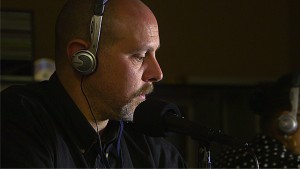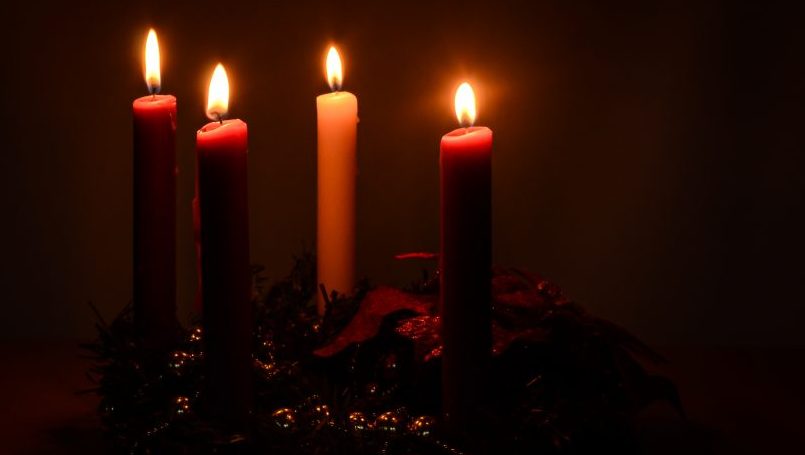Next Sunday is the First Sunday of Advent and we begin getting ready for Christmas. I think we all know that Advent is the four week-period before Christmas. There are always four Sundays of Advent, but it’s not always four weeks. It depends what day of the week December 25th is. This year, the fourth Sunday of Advent is December 24th! So that means that you can go to Mass in the morning for the fourth Sunday in Advent and then you can go back to Mass in the evening or night, for the Christmas Midnight Mass.
The liturgical year begins with the first Sunday of Advent. That means that the first Sunday of Advent is the beginning of the Church year and we begin a new cycle of readings. You may have noticed that for most Sundays this year, we’ve been reading from the Gospel of Matthew. That’s because we are in cycle A. There are three cycles: year A, year B and year C. During year A we read mostly from Matthew. During year B we read from Mark and during year C we read from Luke. Next year (beginning on December 3, 2017 and lasting all through 2018 until the Feast of Christ the King), we will be reading mostly from the Gospel of Mark.
What does this mean for this year’s Advent?
The Christmas story is only found in the Gospels of Matthew and Luke and when we begin the B cycle, reading from Mark, you’ll notice that the readings are not very “Christmasey”. This year we won’t hear the announcement or the birth of John the Baptist (though we will hear about the Baptist); we won’t hear about Joseph’s dream or about Mary’s visit to Elizabeth (although, in a departure from Mark, on the fourth Sunday of Advent, we will read the Annunciation story from Luke).
All that to say that while it’s tempting to find common themes of hope, love, expectation and patience throughout the four weeks of Advent, it’s not always that apparent when you listen to readings about the end of times (preparation is a big theme this year).
Which is why, this year, I’d like to offer four words (or themes) that you can reflect on every Advent, not just the first Sunday in Advent and no matter what the readings are. With each theme, there is a Gospel character to help you reflect and a prayer.
Our first character is Zechariah.
You may remember that he is the father of John the Baptist and the husband of Elizabeth. Scripture tells us that he was of the priestly tribe (Levites) and, both he and Elizabeth were righteous people (Luke 1:5-6).
In Luke chapter 1:8-22, we learn that Zechariah, while doing his priestly duty at the temple was visited by Gabriel, the Archangel. The Angel announces the birth of John the Baptist, Zechariah doubts and Gabriel makes him mute until after the birth.
After the birth, when all the relatives want to name the baby Zechariah, after his father, Zechariah makes clear that his name is John. At that moment is tongue is loosed and he begins praising the Lord (Luke 1:57-66). He prays one of the most beautiful prayers in Scripture (Luke 1:67-79), one that the Church calls the
Benedictus, named after the first word of the prayer in Latin:
Blessed be the Lord, the God if Israel, He has come to his people and set them free….
The canticle ends:
“In the tender compassion of our God, the dawn from on high shall break upon us, to shine on those who dwell in darkness and the shadow of death and to guide our feet into the way of peace.”
And this brings us to our theme for this week: Light.
It’s good to note at this point that one of the priestly duties was to keep the candles lit in front of the Holy of Holies in the Tabernacle.
It’s not a far stretch (nor unique on my part) to pick light as an Advent theme. It's no coincidence or accident that we light candles each Sunday of Advent. The imagery of light is found in many places in our Advent scripture readings. In particular, from Isaiah,
“a people who walked in darkness have seen a great light….” (Isaiah 9:2)
What does light do? It guides; it points the way; it scatters the darkness.
We all know people who are in darkness. Many of us have gone through periods of darkness ourselves. Some of you may be going through a period of darkness right now. Advent announces the light that is to come.
Not only is Advent a time to reflect on the Light that is to come (and that has already come), but it is an opportunity for us to be light in a world that is so often in darkness.
This is what we are called to live during Advent:
- Struggle so that the darkness does not prevent us from living as children of the Light.
- Allow ourselves to listen to the calls of our brothers and sisters and helping them come out of the darkness.
- Do everything we can in order to dispel the darkness that surrounds us.
- Not fall in the temptation of obscuring the Light that one day, 2000 years ago, became man so that all could walk in His Light.
This is the light of the sentinel that keeps watch. The light that allows us to stay awake and alert, as we wait for the dawn that is to come.
This is the Light that guides us towards Christmas.
This Advent let us be Light to illuminate.
Some questions for your personal reflection:
1. What darkness is there in my life / in the life of my loved ones?
2. How can I come out of the darkness?
3. How can I help others come out of their darkness?
Let us Pray:
"In the tender compassion of our God, the dawn from on high shall break upon us, to shine on all who dwell in darkness and the shadow of death and to guide our feet into the way of peace."
Come, Light of the world!

Every week, Deacon Pedro takes a particular topic apart, not so much to explore or explain the subject to its fullness, but rather to provide insights that will deepen our understanding of the subject. And don’t worry, at the end of the day he always puts the pieces back together. There are no limits to deaconstructing: Write to him and ask any questions about the faith or Church teaching:
[email protected] @deaconpedrogm

 Every week, Deacon Pedro takes a particular topic apart, not so much to explore or explain the subject to its fullness, but rather to provide insights that will deepen our understanding of the subject. And don’t worry, at the end of the day he always puts the pieces back together. There are no limits to deaconstructing: Write to him and ask any questions about the faith or Church teaching:[email protected] @deaconpedrogm
Every week, Deacon Pedro takes a particular topic apart, not so much to explore or explain the subject to its fullness, but rather to provide insights that will deepen our understanding of the subject. And don’t worry, at the end of the day he always puts the pieces back together. There are no limits to deaconstructing: Write to him and ask any questions about the faith or Church teaching:[email protected] @deaconpedrogm